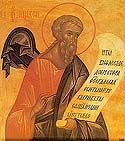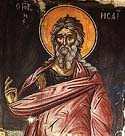|
|||
|---|---|---|---|
| This weekly bulletin insert complements the curriculum published by the Department of Christian Education of the Orthodox Church in America. This and many other Christian Education resources are available at http://dce.oca.org. | |||

One of the themes of Chapter 21 in Proverbs is justice. In 21:3 we read, "To do righteousness and justice is more acceptable to the Lord than sacrifice." This verse may sound familiar, since it is similar to verses from Psalm 51 (50), which is part of many Orthodox worship services: "For You have no delight in sacrifice; were I to give a burnt offering You would not be pleased. The sacrifice acceptable to God is a broken spirit; a broken and contrite heart, O God, You will not despise." These passages reflect a question that the people of Israel took very seriously. They were surrounded by nations whose inhabitants worshipped gods that, in some cases, demanded human sacrifice. These gods seemed to care little for the welfare of human beings or for justice among them. So the question arose of how the people of Israel were to approach their God. Was it with sacrifices and close attention to ritual? Or was it, as the two passages suggest, with contrite hearts that strove to be righteous and just? The prophet Micah presented the question, and gave the answer: "With what shall I come before the Lord, and bow myself before God on high? Shall I come before Him with burnt offerings, with calves a year old? Will the Lord be pleased with thousands of rams, with ten thousands of rivers of oil? Shall I give my first-born for my transgression, the fruit of my body for the sin of my soul?" He has shown you, O man, what is good; and what does the Lord require of you but to do justice, and to love kindness, and to walk humbly with your God?" (6:6-8). The emphasis Micah places on justice is echoed in many other parts of the Old Testament. For example, we read a warning in Proverbs 21: 7 that those who are unwilling to be just bring destruction on themselves: "The violence of the wicked will sweep them away, because they refuse to do what is just." A few verses later (21:15) comes a description of two different reactions to justice: "When justice is done, it is a joy to the righteous, but dismay to evildoers." 
Isaiah's prophecy in 28: 16-17a reveals God's concern for, and love of, justice not only for the present, but in the glorious future as well: "Behold, I am laying in Zion for a foundation a stone, a tested stone, a precious cornerstone, of a sure foundation: He who believes will not be in panic. And I will make justice the line, and righteousness the plummet." The First Letter of Peter, written to encourage persecuted Christians in the early Church, quotes this passage. The letter invites us to come to the "living stone" that is so precious in God's sight: Jesus Christ, the One who brings true justice to the whole world. |
|||
